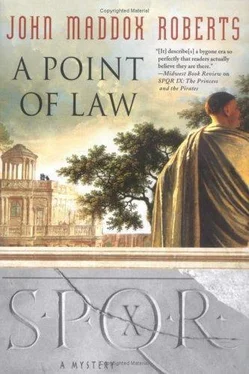John Roberts - A Point of Law
Здесь есть возможность читать онлайн «John Roberts - A Point of Law» весь текст электронной книги совершенно бесплатно (целиком полную версию без сокращений). В некоторых случаях можно слушать аудио, скачать через торрент в формате fb2 и присутствует краткое содержание. Год выпуска: 0101, ISBN: 0101, Издательство: St. Martin, Жанр: Исторический детектив, на английском языке. Описание произведения, (предисловие) а так же отзывы посетителей доступны на портале библиотеки ЛибКат.
- Название:A Point of Law
- Автор:
- Издательство:St. Martin
- Жанр:
- Год:0101
- ISBN:9780312337254
- Рейтинг книги:5 / 5. Голосов: 1
-
Избранное:Добавить в избранное
- Отзывы:
-
Ваша оценка:
- 100
- 1
- 2
- 3
- 4
- 5
A Point of Law: краткое содержание, описание и аннотация
Предлагаем к чтению аннотацию, описание, краткое содержание или предисловие (зависит от того, что написал сам автор книги «A Point of Law»). Если вы не нашли необходимую информацию о книге — напишите в комментариях, мы постараемся отыскать её.
A Point of Law — читать онлайн бесплатно полную книгу (весь текст) целиком
Ниже представлен текст книги, разбитый по страницам. Система сохранения места последней прочитанной страницы, позволяет с удобством читать онлайн бесплатно книгу «A Point of Law», без необходимости каждый раз заново искать на чём Вы остановились. Поставьте закладку, и сможете в любой момент перейти на страницу, на которой закончили чтение.
Интервал:
Закладка:
Here Curio and his claque booed, hissed, shouted, and made rude gestures. Cato ignored them.
“The gods of Rome,” he went on, working himself up to a foaming frenzy, “must be appalled! First, that we even allow this hideous family to reside among us, polluting the sacred precincts of Romulus. Second, that we should even consider a trial of this virtuous young Roman for the murder of one of them! Rather, the Senate should declare days of thanksgiving to the gods for the death of Marcus Fulvius. There should be holidays and rejoicing! We should deck the temples in festive array, people should feast their neighbors and give sacrifices in gratitude that Marcus Fulvius no longer offends the sight of gods and men!”
“Cato’s in fine form today,” muttered someone behind me.
“This is extreme even for him,” Father said. “There’s such a thing as going too far in a denunciation.”
“It’s traditional,” said Scipio, with a shrug in his voice.
“Where is the evidence,” Cato went on, “that Decius Caecilius Metellus the Younger slew Marcus Fulvius, richly though that man deserved it? He spent almost the entirety of that night together with the most illustrious men in Rome, not only the great men of his family, but the distinguished consular Hortensius Hortalus and the estimable Appius Claudius!
“Can it be a matter for wonder that Marcus Fulvius ended up dead? A man like him can number his enemies as an astronomer enumerates the stars! The only cause for wonder is that he could step from his doorway even once without being set upon by the hordes of those he had mortally offended, each of them bent upon revenge and justice! How many aggrieved, cuckolded husbands must have thirsted for his blood? How many fathers of children debauched by Marcus Fulvius must have whetted their daggers in anticipation of that blessed consummation?”
He went on in this vein for some time, making Fulvius sound like a greater menace to Rome than Hannibal had ever been, while I was a savior to compare with Quintus Fabius Maximus Cunctator. It was, as Scipio had intimated, a conventional defense. It was just that Cato was better at the vituperative part than almost anybody. Only Cicero, on one of his best days, could match him.
He ended up with, “Let no tear be shed in Rome for the likes of Marcus Fulvius. Allow the name of this loathsome wretch to be forgotten by all honorable citizens. Let his ashes be entombed in Baiae, along with all the fornicators, whores, and catamites of that accursed city, whose entitlement to Roman citizenship was one of the great moral failings of Roman policy. Let us instead rejoice that we have, and will continue to have, the unstinting, patriotic services of Decius Caecilius Metellus the Younger, a soldier, a statesman, a seeker after justice, a smiter of the wicked and protector of the innocent, whose illustrious ancestors have adorned our city in glory for centuries. Romans, you must find him innocent, even of this crime that was no crime at all!” And with the last word the water clock was empty and the beaker was full.
It was a wonderful performance, and the applause was loud and lasted a long time. Then Manilius rose from his bench and the noise abated. The slave put in the plug, hoisted the beaker and poured the water back into the bronze cylinder of the clock. He set the beaker back under the spout and, at the tribune’s nod, removed the plug again.
“Citizens,” he began, in a voice that was not strident like Cato’s but carried as far, “the illustrious Marcus Porcius Cato has provided us with splendid entertainment but little of substance. As to the constitutionality of this court, it is a favor to the esteemed Senator Metellus that we hold it at all. When the late Marcus Fulvius leveled his charges against the senator, the praetor Marcus Juventius Laterensis scheduled a trial in his court for the next day, in violation of the usual custom. And why was this? Because, as all know, it is election time. Any trial not held now will have to be carried over into next year, with a new set of magistrates in office. That would mean that the senator could not stand for praetor in tomorrow’s election, and would he wish that?”
Voices throughout the crowd proclaimed that this would certainly not be the case. I tried to make out who was saying this, but couldn’t discern much in the sea of faces. Probably Manilius’s clients, I thought, whose duty it was to applaud and repeat their patron’s most telling points. My own would do the same.
“As for the competence of the comitia tribute to try a capital case, that is debatable, but it is not at issue here. Roman justice does not call for the death penalty to be applied against a Roman citizen for the slaying of another, save in very special, narrow circumstances. Citizens,” here his gestures, expression, and tone conveyed great sadness, “the sorry fact is that we have become so accustomed to murder that we are no longer shocked by it. A slaughter that once would have roused the public to fury is now greeted with shrugs and yawns. This, even when the victim is of senatorial status. And who has brought us to such a pass? Why, the senators themselves, who, from being the dispensers of justice, have become the perpetrators of internecine butchery!” Now his voice climbed in high emotion.
“I don’t like the sound of this,” Scipio said behind me. All the others agreed.
“Have we not all seen,” Manilius went on, “how these supposed ‘conscript fathers’ have schemed and conspired against one another for power, prestige, and honor? One after another has trodden upon the bodies of the others to make himself ‘first among equals,’ only to be brought down in his turn. Cneaus Pompeius Magnus”-here he extended a finger toward Pompey-“has inveighed against the violent street gangs and taken action to drive them from Rome. But who was behind those gangs? Were they enriching themselves? Nonsense! Were they advancing the cause of the people? Laughable! No, they were each and every one in the employ of one or another of the little senatorial cliques, of vile, ambitious men who keep their own hands clean while ordering others to do the dirty work!”
The crowd vented an ugly grumble. This was looking bad. What made it worse was that everything he said was perfectly true.
“He’s not talking like a prosecutor,” Father said. “He’s talking like a candidate!”
“What’s the difference?” asked Creticus, setting off a nervous chuckle from the others.
“And now,” Manilius went on, “absolutely no one is surprised that an obscure man, a man of great family but one who had not yet won distinction in Rome, was murdered. And why? Because he had shown the temerity to attack, openly and honestly, a member of one of the Senate’s most powerful families! Did he attack this Metellus from behind, at night, with a dagger? No! He accused him openly of criminal malfeasance on Cyprus, took his accusation to a praetor, and then went to the Forum and sought out Metellus, repeating the charges in public, to his face. Are these the actions of a cowardly, dishonest, conniving wretch? Are these not, rather, the actions of a man devoted to the service of the state in the greatest Roman tradition?” This was received with an angry, frightening cheer. Gaul was sounding better by the minute.
“The esteemed senator Marcus Porcius Cato,” he drove on relentlessly, giving an amazingly contemptuous twist to the word “esteemed,” “has denounced the family of Marcus Fulvius as infamous. Upon what basis does he make this scurrilous charge? Residence at Baiae? Only Cato, that upright, righteous defender of Roman virtue, could find fault with that lovely resort city, where Cicero, Hortensius Hortalus, and Gnaeus Pompeius Magnus himself all own villas!” This time there was derisive laughter, which was at least better than the angry growl.
Читать дальшеИнтервал:
Закладка:
Похожие книги на «A Point of Law»
Представляем Вашему вниманию похожие книги на «A Point of Law» списком для выбора. Мы отобрали схожую по названию и смыслу литературу в надежде предоставить читателям больше вариантов отыскать новые, интересные, ещё непрочитанные произведения.
Обсуждение, отзывы о книге «A Point of Law» и просто собственные мнения читателей. Оставьте ваши комментарии, напишите, что Вы думаете о произведении, его смысле или главных героях. Укажите что конкретно понравилось, а что нет, и почему Вы так считаете.









